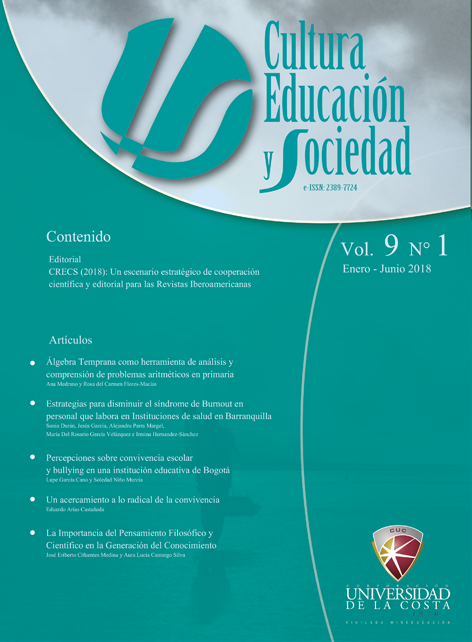School coexistence through research as a pedagogical strategy
DOI:
https://doi.org/10.17981/cultedusoc.9.1.2018.07Keywords:
School coexistence; research; pedagogical strategyAbstract
Education in Colombia seeks that educational institutions form critical, analytical, innovative people, with autonomous and cooperative work capabilities, where spaces for socialization and participation free of violence and discrimination are promoted, the purpose of the study was to strengthen school coexistence through research as a pedagogical strategy (IEP). The study was of qualitative type using the action research model, the participating population was made up of eighty-nine (89) IED San José de Kennedy students. Datalogging and direct observation were used as data collection techniques. It was evidenced that the students present disruptive behaviors such as: defiance of authority, interpersonal conflicts, bullying, discrimination, consumption of psychoactive substances, early pregnancy, disrespect to teachers and administrative body, thus deteriorating the social fabric and school coexistence. In order to strengthen school coexistence, the consensus and democratic work of norms that guarantee such coexistence is recommended.
Downloads
References
Antequera-Manotas, E., & Cortés-Peña, O. (2016). Problems, cha-llenges, trends and prospects for special education for talented children. The European Proce-edings of Social & Behavioural Sciences–EpSBS, 16(1), 857-861.Antúnez, S. (1994). Claves para la organización de centros escola-res. Barcelona: ICE-Horsori.
Araque, F., & Suárez, O. (2017). Reflexiones teóricas y legales del adulto mayor y la discapacidad en Colombia. Juridicas CUC, 13(1), 97-12 0.
Avendaño-Villa, I., Cortés-Peña, O. F., & Guerrero-Cuentas, H. (2015). Competencias sociales y tecnologías de la información y la comunicación como factores asociados al desempeño en estu-diantes de básica primaria con experiencia de desplazamiento forzado. Diversitas, 11(1), 13-36.
Cerezo, F. (2009). Bullying: análisis de la situación en las aulas es-pañolas. International Journal of Psychology and Psychological Therapy, 9(3). 367-378.
De La Cisterna, C. A. (2010). Manual de convivencia. Santiago de Chile: Colegio Adventista de La Cisterna.
De la Concepción, A. (2015). Concepciones sobre participación de niñas, niños y adolescentes: Su importancia en la construcción de la convivencia escolar. Cul-tura Educación y Sociedad 6(2), 9-28.
Díaz-Aguado, M. J. (2002). Convivencia escolar y prevención de la violencia. Ministerio de Educación - Instituto de Tecnologías Educativas.
Graffe, G. J. (2002). Gestión educativa para la transformación de la escuela. Revista de Pedagogía, 23(6 8), 49 5 - 517.
Grande, M. J. C. (2010). Convivencia escolar. Un estudio sobre buenas prácticas. Revista de paz y conflictos, 3(1), 154 -169.
Gravini, M. (2010). Estilos de aprendizaje: Un factor para tener en cuenta en la orientación profesio-nal. Cultura Educación y Sociedad, 1(1). 75-80.
Guerrero, H. R., Crissien, T. J., & Paniagua, R. (2017). Proyectos Educativos Institucionales Colombianos (PEI): Educación Inclusiva a través de la autoevaluación. Opción, 33(84). 218-266.
Hernández, R., Fernández, C., & Baptista, P. (2010). Metodología de la investigación. México, D.F.: Editorial Mc Graw Hill.
Hernández, H., & Jiménez , A. (2015). Responsabilidad social empresarial, zona urbana del distrito de barranquilla: estudio etnográfico. Económicas CUC, 36(2), 9 -18 .
Ianni, N. (2003). La convivencia escolar: una tarea necesaria, posible y compleja. Ciudadanía, democracia y valores en sociedades plurales, 22(2).
López, J. (2003). Compartir el mismo espacio y tiempo virtual: una propuesta de investigación para la intervención pedagógica. Revista de educación, (332), 213-231.
Nail, O., Gajardo, J., & Muñoz, M. (2012). La técnica de análisis de incidentes críticos: Una herramienta para la reflexión sobre prácticas docentes en convivencia escolar. Psicoperspectivas, 11(2), 56 -76.
Ocampo, M., Briceño, S., Hernández, M., & Olano, M. (2010). Estrategias para mejorar la convivencia en el colegio Cristóbal Colon, Instituto Educativo Distrital. Cuadernos Hispano Americanos de Psicología, 10(2), 46-61.
Olivencia, J. (2009). Educación y conflicto en escuelas interculturales: valores y concepciones pedagógicas del profesorado sobre convivencia y diversidad cultural. Educacion y diversidad. Education and diversity: Revista interuniversitaria de investigación sobre discapacidad e interculturalidad, (3), 107-149.
Olivencia, J. (2012). La formación en educación intercultural del profesorado y la comunidad educativa. Revista Electrónica de Investigación y Docencia (REID), 2, 8-31.
Pérez, V. (2001). Convivencia escolar: problemas y soluciones. Revista Complutense de Educación, 12(1), 295-318.
Pinto, M. & Misas, M. (2014). La educación inicial y la educación pre-escolar: Perspectivas de desarrollo en colombia y su importancia en la configuración del mundo de los niños. Cultura Educación y Socie-dad 5(1), 119-140.
Restrepo, B. (2004). La investigación-acción educativa y la construcción de saber pedagógico. Educación y educadores, (7).
Downloads
Published
How to Cite
Issue
Section
License
Copyright (c) 2018 CULTURA EDUCACIÓN Y SOCIEDAD

This work is licensed under a Creative Commons Attribution-NonCommercial-NoDerivatives 4.0 International License.
![]()
Creative Commons 2020 CULTURA EDUCACIÓN Y SOCIEDAD
This article is under international license Creative Commons Reconocimiento-NoComercial-SinObrasDerivadas 4.0.
The published articles are the sole responsibility of their authors and do not necessarily reflect the opinions of the editorial committee.
CULTURA EDUCACIÓN Y SOCIEDAD respects the moral rights of its authors, who assign to the editorial committee the patrimonial rights of the published material. In turn, the authors inform that this work is unpublished and has not been previously published.
All articles are under a:
Licencia Creative Commons Atribución-NoComercial-SinDerivadas 4.0 Internacional.
![]()


 English
English
 Español (España)
Español (España)




_12.53_.27_p_. m_._3.png)





_12.57_.35_p_. m_._3.png)
_12.50_.37_p_. m_._3.png)



